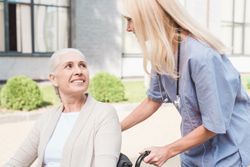What Senior Care Providers Need to Know About Strokes

Stroke is the fifth-leading cause of death in the U.S. and one of the leading causes of long-term disability. As such, disability and senior care providers know the toll it can take on individuals and their families. Fortunately, there are many resources available for prevention as well as recovery. Here’s what you should know.
A Guide to Senior Care & Strokes
What Is a Stroke?
Strokes are most commonly associated with older adults. However, they can occur at any age. A stroke does to the brain what a heart attack does to the cardiovascular system, suddenly cutting off the blood supply. When brain cells don’t receive the oxygen they need from blood, they begin to die. This results in a loss of function in the affected part of the brain. Many people have difficulty with memory or muscle control after a stroke, and some do not survive the attack. Strokes are typically caused by abrupt artery blockage, although they can also be caused by burst blood vessels in the brain tissue.
What Are the Risk Factors?
 The leading causes of stroke are lifestyle factors, such as obesity, smoking, high cholesterol, and diabetes. Managing these health conditions is key to reducing the risk. Exercising, eating right, and getting routine medical checkups all help. In the event a stroke occurs, fast action is crucial to reduce damage and prevent a fatality. The primary symptoms of a stroke include facial drooping, arm weakness, and difficulty speaking. Call 911 immediately if you notice these signs in a loved one.
The leading causes of stroke are lifestyle factors, such as obesity, smoking, high cholesterol, and diabetes. Managing these health conditions is key to reducing the risk. Exercising, eating right, and getting routine medical checkups all help. In the event a stroke occurs, fast action is crucial to reduce damage and prevent a fatality. The primary symptoms of a stroke include facial drooping, arm weakness, and difficulty speaking. Call 911 immediately if you notice these signs in a loved one.
What Is the Recovery Process?
The recovery process can vary greatly depending on the individual’s age and overall health, as well as the severity of the stroke. Home health and senior care providers offer a range of options, including in-home health care, nursing homes, and rehabilitation centers. There are also outpatient programs, such as occupational and speech therapy. There is no set recovery timeline as this depends on a variety of factors. However, most people see improvement within three months to a year after the attack. If a person chooses to live at home after a stroke, they’ll need to ensure their home is adequately equipped to prevent slips and falls and allow easier accessibility
Strokes can affect people in various ways and require different levels of care. Whatever your needs, Home Helpers of Jacksonville in Calhoun County, AL, can help. Their team of experienced, compassionate senior care professionals addresses both the physical and emotional needs of their clients. From stroke to dementia care, they are highly trained to understand these complex medical conditions and the treatment they require. Call (256) 776-7769 to speak with a helpful staff member or visit the website to learn more about what they can do for your family.
About the Business
Have a question? Ask the experts!
Send your question

